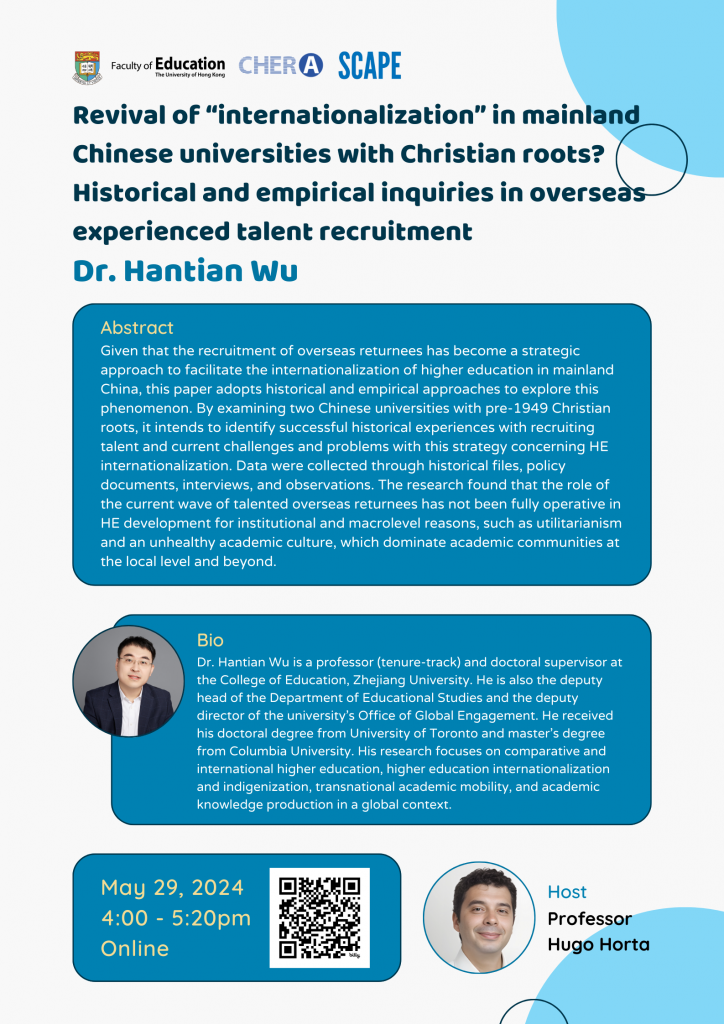
Date: 29th May, 2024 (Wednesday)
Time: 4:00 p.m. – 5:20 p.m. (GMT+8)
Mode: Online (via ZOOM)
Speaker: Dr. Hantian Wu (Zhejiang University)
Chair: Professor Hugo Horta (The University of Hong Kong)
Abstract
Internationalization has been a priority in mainland China’s higher education development for the past two decades, and recruiting overseas returnees has become a strategic approach to facilitate it. Such practices have deep historical roots that predate 1949, especially in Christian universities established by foreign missionaries. Pre-1949 Christian universities in China, such as St. John’s University in Shanghai and Soochow University in Jiangsu Province, were considered “world-class universities with Chinese characteristics” (Perry & Tu, 2020, p.35). Given that recruiting scholars with foreign credentials has become a crucial strategy for improving Chinese higher education, this research adopts historical and empirical approaches to examine the histories and current situations of two case institutions related to this matter. It focuses on answering the main research question: How do the historical roots of the case institutions influence their current internationalization practices, and what are the effects and reasons?
Based on theoretical perspectives related to higher education internationalization and indigenization (e.g., Lingard and Rizvi, 1998; Wu and Zha, 2018), an intrinsic case study, which maintains the research interest in the case itself (Stake, 2005), has been conducted for two Chinese institutions, East China Normal University and Soochow University, and their respective predecessors (i.e., St. John’s University and Christian Soochow [Dongwu] University). Data were collected through historical files, policy documents, interviews, and observations. By examining these two universities with pre-1949 Christian roots, the research intends to identify successful historical experiences with talent recruitment and current challenges and problems with the overseas experienced talent recruitment strategy concerning higher education internationalization. Findings from historical analysis and fieldwork reveal that the role of the current wave of talented overseas returnees has not been fully operative in mainland China’s higher education development for institutional and macro-level reasons, such as utilitarianism and an unhealthy academic culture, which dominate academic communities at the local level and beyond. It highlights that the marginalization of overseas returnees can hinder both substantive international research collaborations and the development of students’ intercultural communication skills, and suggests that further research on mainland China’s academic culture and its historical roots is necessary.
About the Speaker
Dr. Hantian Wu is a professor (tenure-track) and doctoral supervisor at the College of Education, Zhejiang University. He is also the deputy head of the Department of Educational Studies and the deputy director of the university’s Office of Global Engagement. He received his doctoral degree from OISE, University of Toronto, under the supervision of Prof. Ruth Hayhoe, and his master’s degree from Teachers College, Columbia University. He conducted postdoctoral research at the Institute of Higher Education, East China Normal University. His research focuses on comparative and international higher education, higher education internationalization and indigenization, transnational academic mobility, and academic knowledge production in a global context. His research on these topics has been published in Higher Education, Studies in Higher Education, and the Journal of Studies in International Education, as well as some prestigious Chinese journals.
Registration Form: https://hku.zoom.us/meeting/register/tJAude6pqzssHdfrv_7euAxphDhKYbfCGzNd
